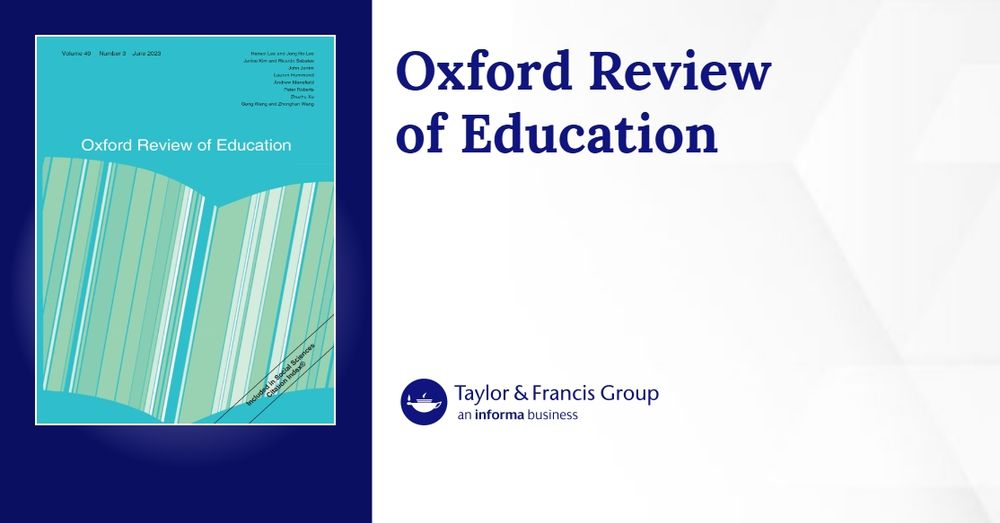

To decide who gets the chop, they generated an academic contribution metric that is a raw count of *any type* of output, including book reviews.
The management of UK Universities continues to amaze
"Our essay explores the political economy of academic publishing ... in terms of how the commodification of academic research has opened avenues for the same mechanisms that underpin the deterioration of digital marketplaces to infiltrate online academic publishing."
"Our essay explores the political economy of academic publishing ... in terms of how the commodification of academic research has opened avenues for the same mechanisms that underpin the deterioration of digital marketplaces to infiltrate online academic publishing."
european-alternatives.eu

1️⃣ introduce new policy/system/tool without evidence
2️⃣ then claim need for data/evidence to support success
3️⃣ THEN blame teachers/schools if it isn't successful
(#3 is already happening, btw)
Convenient that *now* is the time for evidence, once these products are released and pushed into schools.

1️⃣ introduce new policy/system/tool without evidence
2️⃣ then claim need for data/evidence to support success
3️⃣ THEN blame teachers/schools if it isn't successful
(#3 is already happening, btw)
Convenient that *now* is the time for evidence, once these products are released and pushed into schools.

Convenient that *now* is the time for evidence, once these products are released and pushed into schools.
archive.md/PHqyF
archive.md/PHqyF
In this editorial for our new issue, @discoursology.bsky.social, @lucipangrazio.bsky.social, @johnpp.bsky.social & @benpatrickwill.bsky.social reflect on the current moment of critical research on educational technologies.
Read all articles: tinyurl.com/5ewyb9fn

In this editorial for our new issue, @discoursology.bsky.social, @lucipangrazio.bsky.social, @johnpp.bsky.social & @benpatrickwill.bsky.social reflect on the current moment of critical research on educational technologies.
Read all articles: tinyurl.com/5ewyb9fn
- taking political economy seriously
- better theory development
- affirmative critiques
- focus on environmental extractivism
Oh, and don't make AI write your papers!
doi.org/10.1080/1743...
- taking political economy seriously
- better theory development
- affirmative critiques
- focus on environmental extractivism
Oh, and don't make AI write your papers!
doi.org/10.1080/1743...


(It also makes up something for Macgilchrist, and more.)
(It also makes up something for Macgilchrist, and more.)
Checking new manuscripts today I reviewed a paper attributing 2 papers to me I did not write. A daft thing for an author to do of course. But intrigued I web searched up one of the titles and that's when it got real weird...
Checking new manuscripts today I reviewed a paper attributing 2 papers to me I did not write. A daft thing for an author to do of course. But intrigued I web searched up one of the titles and that's when it got real weird...
www.frontiersin.org/documents/un...

www.frontiersin.org/documents/un...

No wonder budgets are tightening. Imagine if we took that money back from the slop peddlers and their boosters…
www.bloomberg.com/news/article...

No wonder budgets are tightening. Imagine if we took that money back from the slop peddlers and their boosters…
www.bloomberg.com/news/article...
I analysed the sentiment of every X post from DSIT that mentioned "AI" this year. Of 122 posts, 110 were positive about AI, and only 7 mentioned its downsides.
🧵 1/2

I analysed the sentiment of every X post from DSIT that mentioned "AI" this year. Of 122 posts, 110 were positive about AI, and only 7 mentioned its downsides.
🧵 1/2

Avriel Epps & I see it as "grantwashing," and it's an insult to anyone whose loved one's death involved chatbots. We explain:
www.techpolicy.press/beware-of-op...

Avriel Epps & I see it as "grantwashing," and it's an insult to anyone whose loved one's death involved chatbots. We explain:
www.techpolicy.press/beware-of-op...




